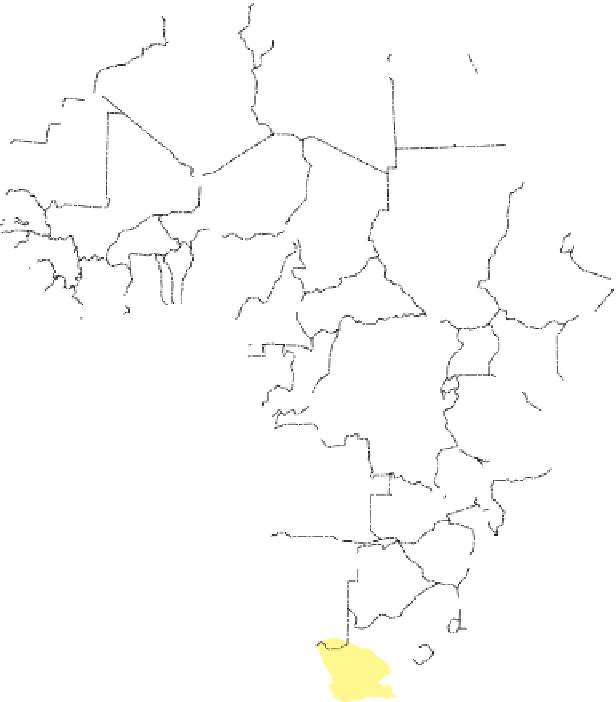Geography Reference
In-Depth Information
LANGUAGE FAMILIES OF AFRICA
2B
2B
2B
SPANISH
1B
2B
2A
2A
TEDA
2B
2C
4
2A
5A
3A
3D
5A
MOSSI
HAUSA
FULANI
3B
3E
NUER
3E
YORUBA
BANDA
SIDAMO
3C
GBAYA
KRU
5A
5B
INDO-EUROPEAN FAMILY
1A Germanic Subfamily
1
1B Romance Subfamily
MONGO
3E
AFRO-ASIATIC FAMILY
2A Semitic Subfamily
2
BALUBA
2B Berber Subfamily
2C Cushitic Subfamily
3E
MBUNDU
NIGER-CONGO FAMILY
3A Atlantic Subfamily
3B Voltaic Subfamily
3C Guinea Subfamily
3
12A
3D Hausa Subfamily
3E Bantu Subfamily
6
1A
3E
ZULU
SAHARAN FAMILY
SOTHO
4
1A
1A
X
SUDANIC FAMILY
5A Central and Eastern Subfamily
5B Nilotic Subfamily
1A
5
ENGLISH
Figure 6.14
Language Families of Africa.
Regional
classifi cation of African Language Families.
Adapted with permission from
: Hammond,
Inc., 1977.
KHOISAN FAMILY
6
AUSTRONESIAN
13A Indonesian Subfamily
13
borders for less than a century. European colonists are
responsible for the arbitrary borders of most of Africa—
borders that ignore cultural divides. When Nigeria
gained its independence in 1962, the government decided
to adopt English as the “offi cial” language, as the three
major regional languages are too politically charged and
thus unsuitable as national languages.
When Nigeria's children go to school, they fi rst must
learn English, which is used for all subsequent instruction.
Certainly, the use of English has helped Nigeria avoid some
confl icts based on language, but Nigerian educators, espe-
cially in the north, are having second thoughts about the
policy. Upon entering school, children who have grown up
speaking a local language are suddenly confronted with a
new, unfamiliar tongue. The time and energy spent learn-
ing English takes away from learning other subjects.
Moreover, for many students, knowledge of English is
irrelevant when they emerge from school (as many do after
only six years) unable to function in local Nigerian society.
Nigeria is having serious doubts about its relationship with
the English language brought there by the colonists who
arbitrarily established their multilinguistic and multieth-
nic country in the fi rst place.
Education also affects the distribution of languages across the
globe and within regions and countries. Thinking about dif-
ferent regions of the world, consider how education plays a
role in the distribution of English speakers. Who learns English
in each of these regions and why? What role does education
play in the global distribution of English speakers?



















































































































































































